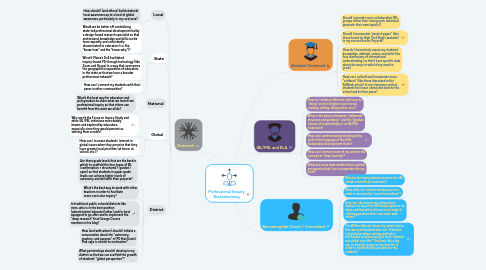
1. Outreach
1.1. Local
1.1.1. How should I (and others) build students’ local awareness up to a level of global awareness, particularly in my rural area?
1.2. State
1.2.1. Would we be better off centralizing state-led professional development led by a design-based research specialist so that professional knowledge and skills can be more expertly and consistently disseminated to educators (i.e. the “know-how” and the “know-why”)?
1.2.2. What if Maine’s DoE facilitated inquiry-based PD through technology (like Zoom and Skype) in a way that overcomes the geographical separation of educators in the state so that we have a broader professional network?
1.2.3. How can I connect my students with their peers in other communities?
1.3. National
1.3.1. What’s the best way for educators and policymakers to share what we learn from professional inquiry so that others can benefit from the work we all do?
1.4. Global
1.4.1. Why aren’t the Focus on Inquiry Study and other IBL/PBL initiatives more widely known and explored by educators, especially since they would prevent us starting from scratch?
1.4.2. How can I increase students’ interest in global issues when they perceive that they have greater local priorities (at home, at school, etc.)?
1.5. District
1.5.1. Are there grade levels that are the best in which to scaffold the four types of IBL (confirmation > structured > guided > open) so that students in upper grade levels can achieve higher levels of autonomy and skill with their projects?
1.5.2. What's the best way to work with other teachers in order to facilitate cross-curricular inquiry?
1.5.3. In traditional public schools/districts like mine, who is in the best position (administrator/educator/other) and/or best equipped to go after and to implement the “deep research” that George Couros mentions in his blog?
1.5.4. How (and with whom) should I initiate a conversation about the “autonomy, mastery, and purpose” of PD that Daniel Pink says is central to motivation?
1.5.5. What partnerships should I develop in my district so that we can scaffold the growth of students’ “global perspective”?
